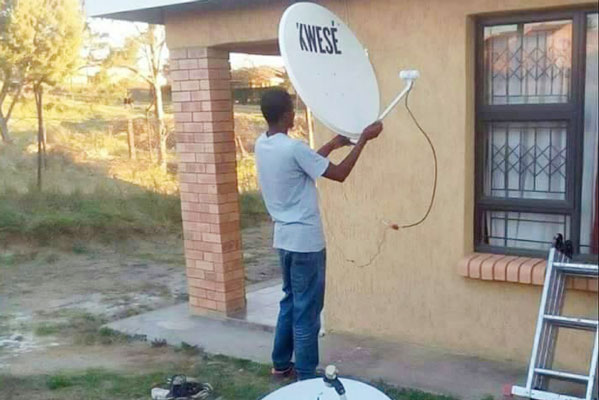
ECONET recorded brisk business in Harare yesterday after its shops started selling accessories for its new television pay-per-view offering Kwese TV following a High Court ruling overturning a government ban against the service.
BY VENERANDA LANGA
Kwese TV is a direct competitor to Multichoice of South Africa, which owns DStv.
On Friday, High Court judge Justice Charles Hungwe ruled that the Broadcasting Authority of Zimbabwe (BAZ)’s move to ban Kwese TV was null and void, paving the way for Econet to roll out the service.
The telecommunications giant immediately unveiled a promotion where customers can buy a decoder for $49 and get a free standard installation as well as one month free subscription.
The Kwese TV bouquet offers a variety of television channels ranging from movies and series, sports, kids television, music, news, lifestyle and religious and faith oriented networks.
Customers swamped many Econet shops in Harare and some had to readjust the closing times from 1pm to 5pm to deal with the high volume of buyers.
Meanwhile, free media lobby groups welcomed the High Court judgement, saying it was a positive move, which will bring in diversity and plurality in the Zimbabwean broadcasting sector.
- Chamisa under fire over US$120K donation
- Mavhunga puts DeMbare into Chibuku quarterfinals
- Pension funds bet on Cabora Bassa oilfields
- Councils defy govt fire tender directive
Keep Reading
Voluntary Media Council of Zimbabwe executive director Loughty Dube said Kwese TV’s entry would usher in free access to information and freedom of expression.
“We have always been calling for the opening up of the airwaves because what we have always seen is plurality of the same people belonging to the same political party, and propagating the same ideologies,” he said.
“Apart from offering employment, Kwese TV will offer a new perspective, and overturning of the ban by the High Court is a step towards supporting what President Robert Mugabe said, that locals must be given a chance to thrive in business, and this is a positive development.”

Dube said what was needed now was for BAZ to uphold the High Court judgement.
Zimbabwe Association of Community Radio Stations programmes manager Kudzai Kwangwari said the overturning of the ban showed that the judiciary was progressive.
“However, what we are worried about is the political attitude and behaviour, which continues to reign supreme even in the face of court judgements,” he said.
“The judgement by Justice Hungwe is fair but it is political will to fully implement it, which is needed.
“We now want to see full implementation by BAZ because we want citizens to benefit in terms of access to information.” Kwangwari said media bodies were celebrating the court judgement cautiously because it was at the political level that most challenges in opening up the airwaves emanates from.
“We want to see diversity in the broadcasting industry so that citizens have a wide range of choices to make. Kwese TV is going to provide a different product and when there is competition, there are benefits in that prices go down,” he said.
Media researcher Gift Mambipiri described the judgement as “mathematical”, saying the problem with Zimbabwe was lack of political will to implement what the law says.
“I do not think that our political leaders will allow Kwese TV to take off. It is a mirage to talk of opening up the airwaves in Zimbabwe,” he said.
“The only platforms that have been opened up are for state actors like Information Communication Technology minister Supa Mandiwanzira to operate.
“The key decision to open up the airwaves will come out of political processes because law follows politics.”
He said the Zimbabwe Information Media Panel of Inquiry report revealed that Zimbabweans wanted media plurality and community radio stations, but government made sure the report did not see the light of the day.











